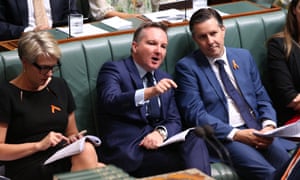A senior union official and member of the ALP national executive says
the debate about making wealthy individuals pay a minimum rate of tax
is not over, despite the shadow treasurer Chris Bowen ruling out a “Buffett rule” as policy for the next election.
In an interview with the Guardian’s Australian Politics Live podcast, Bowen said a “Buffett rule” – which stipulates that high-wealth individuals pay a minimum rate of tax – “won’t be part of the policy we take to the next election”.
Despite Bowen’s emphatic rejection of the policy, the concept retains strong support in sections of the Labor left, and in the trade union movement.
Tim Ayers, the NSW secretary of the Australian Manufacturing Workers’ Union, told Guardian Australia on Tuesday Bowen’s comments were not the end of the matter. “It’s way too early to be ruling measures out,” he said.
Ayers acknowledged Bowen had been an advocate for “bold reform” in economic policy and he said the looming debate inside the party and the movement would be constructive.
But he added: “I don’t think anybody thinks that requiring people on
over $300,000 to pay 35% is a particularly radical concept.”
He said muscular policy measures dealing with inequality had to be “core to Labor’s offering to people left behind by globalisation”.
Left figures inside the federal Labor caucus have been pushing Bowen for months to give the proposal serious consideration, and one prominent rightwinger, the former Labor treasurer Wayne Swan, used a speech to the Australian Workers’ Union conference a month ago to argue Labor needed to consider the merits of the “Buffett rule.”
Many left figures see the “Buffett rule” as an important symbol of redistributive policies, and argue the concept would be politically potent.
Bowen’s comments come at the opening of Labor’s official policy formation process, and some party insiders believe the shadow treasurer made the public intervention in an effort to build internal support to try and halt momentum around the proposal.
The Labor leader, Bill Shorten, has also indicated he’s not a fan of the proposal.
The shadow treasurer said in the interview he had pursued, and would continue to pursue, progressive and redistributive policies between now and the next election, but he said the “Buffett rule” was too blunt an instrument.
Bowen also argued it was not so much a rule but a concept, “because no country has done it”.
“It is actually the Buffett concept because no country has done it, it is not the law of the land anywhere, and no progressive party has it as its policy,” Bowen said.
“It’s a concept, an idea.”
In an interview with the Guardian’s Australian Politics Live podcast, Bowen said a “Buffett rule” – which stipulates that high-wealth individuals pay a minimum rate of tax – “won’t be part of the policy we take to the next election”.
Despite Bowen’s emphatic rejection of the policy, the concept retains strong support in sections of the Labor left, and in the trade union movement.
Tim Ayers, the NSW secretary of the Australian Manufacturing Workers’ Union, told Guardian Australia on Tuesday Bowen’s comments were not the end of the matter. “It’s way too early to be ruling measures out,” he said.
Ayers acknowledged Bowen had been an advocate for “bold reform” in economic policy and he said the looming debate inside the party and the movement would be constructive.
He said muscular policy measures dealing with inequality had to be “core to Labor’s offering to people left behind by globalisation”.
Left figures inside the federal Labor caucus have been pushing Bowen for months to give the proposal serious consideration, and one prominent rightwinger, the former Labor treasurer Wayne Swan, used a speech to the Australian Workers’ Union conference a month ago to argue Labor needed to consider the merits of the “Buffett rule.”
Many left figures see the “Buffett rule” as an important symbol of redistributive policies, and argue the concept would be politically potent.
Bowen’s comments come at the opening of Labor’s official policy formation process, and some party insiders believe the shadow treasurer made the public intervention in an effort to build internal support to try and halt momentum around the proposal.
The Labor leader, Bill Shorten, has also indicated he’s not a fan of the proposal.
The shadow treasurer said in the interview he had pursued, and would continue to pursue, progressive and redistributive policies between now and the next election, but he said the “Buffett rule” was too blunt an instrument.
Bowen also argued it was not so much a rule but a concept, “because no country has done it”.
“It is actually the Buffett concept because no country has done it, it is not the law of the land anywhere, and no progressive party has it as its policy,” Bowen said.
“It’s a concept, an idea.”

No comments:
Post a Comment